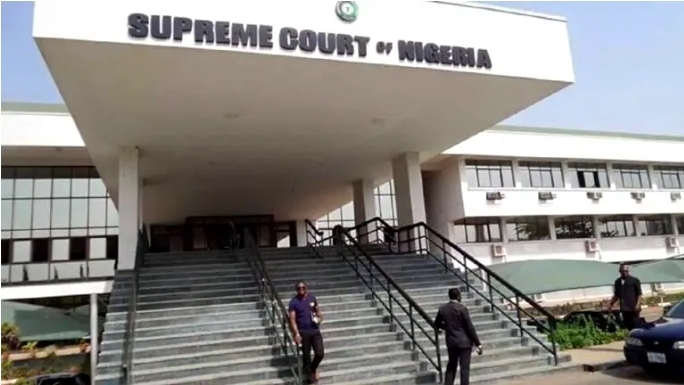
The Supreme Court on Thursday reserved judgment in the suit filed by President Muhammadu Buhari and Attorney-General of the Federation Abubakar Malami, to void the provisions of Section 84(12) of the Electoral Act, 2022.
Justice Musa Dattijo, who led the seven-member panel of the Justices of the apex court reserved judgment after counsel to all the parties adopted all their processes.
He, however, said the court will announce a date to parties involved for judgment.
The News Agency of Nigeria (NAN) reports that on May 19, the apex court admitted an application filed by Rivers to be joined in the suit.
The apex court, had allowed the joinder application that Rivers brought through the Speaker of its House of Assembly and its Attorney-General and adjourned hearing on the suit until May 26.
The applicants told the court that they were opposed to the suit marked SC/CV/504/2022, which originally had the National Assembly as the sole Respondent.
NAN reports that Buhari and Malami filed a suit at the Supreme Court, seeking an interpretation of Section 84(12) of the Electoral Amendment Act 2022.
They are seeking an order of the apex court to strike out the section of the Electoral Act, saying it is inconsistent with the nation’s Constitution.
Justice Musa Dattijo, who led the seven-member panel of the Justices of the apex court on Thursday, allowed the joinder application that Rivers brought through the Speaker of its House of Assembly and its Attorney-General and adjourned hearing on the suit until May 26.
They are seeking an order of the apex court to strike out the section of the Electoral Act, saying it is inconsistent with the nation’s Constitution.
According to the court document, the plaintiffs contend that Section 84 (12) of the Electoral (Amendment) Act, 2022 is inconsistent with the provisions of Sections 42, 65, 66, 106, 107, 131, 137, 147, 151, 177, 182, 192 and 196 of the Constitution of Federal Republic of Nigeria, 1999, (as amended), as well as Article 2 of the African Charter on Human and People and Peoples Rights.
They also contended that the Constitution already provides qualification and disqualification for the offices of the President and Vice President, Governor and Deputy Governor, Senate and House of Representatives, House of Assembly, Ministers, Commissioners, and Special Advisers.
They urged the court to make a declaration that the joint and combined reading of sections 65, 66, 106, 107, 131, 137, 147, 151, 177, 182, 192 and 196 of the Constitution of the Federal Republic of Nigeria, 1999, (as amended); the provision of Section 84 (12) of the Electoral Act, 2022, which also ignores Section 84(3) of the same Act, is an additional qualifying and/or disqualifying factors for the National Assembly, House of Assembly, Gubernatorial and Presidential elections as enshrined in the said constitution, hence unconstitutional, unlawful, null and void.”
In the same vein, the National Assembly had asked the Supreme Court to strike out the suit.
The National Assembly, in its counter-affidavit, filed by its lawyer, Kayode Ajulo, said the Supreme Court cannot be invoked to amend the provision of any law validity made by lawmakers in the exercise of their legislative powers as granted by the Constitution.
Credit: The Vanguard.